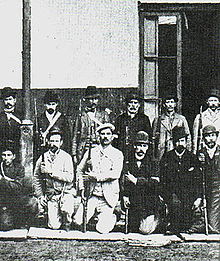Revolution of 1893, Argentina
| Revolution of 1893 | |||||||||||
|---|---|---|---|---|---|---|---|---|---|---|---|
 |
|||||||||||
|
|||||||||||
| Government-Insurgents | |||||||||||
|
|
|
||||||||||
| Commanders and leaders | |||||||||||
|
|
|
||||||||||
The Argentine Revolution was a violent uprising by the Radical Civic Union (UCR) against the Government of Argentina. Initially, the UCR leadership attempted to take power by legal means, but this allowed the government to suppress their movement by force.
The Revolution was prepared from Hipólito Yrigoyen and Aristóbulo del Valle unbeknownst to Alem. and Del Valle shared Yrigoyen, against the rest of the radicals, the conviction that UCR should not take the national power through a coup as the failed 1890 constitutional legality to interrupt, but by provincial insurrections, which would lead to the intervention of the provinces and the holding of elections free.
The July 28 revolution started in San Luis Province directed by Teófilo Saa. The revolutionaries quickly took all official dealings and forced the governor to resign as interim governor settled Saa.
The July 30 revolution broke out in Santa Fe. After several days of bloody fighting, finally defeat the provincial government, headed by the governor at the time, Dr. Juan Manuel Cafferata (one of the few members of the National Autonomous Party had assumed power legitimately), and 4 August government takes radical Mariano Candioti. Among the revolutionary leaders was also Lisandro de la Torre.
The revolution in the Buenos Aires by Hipólito Yrigoyen was the best organized and the most powerful. It began at dawn on 30 July simultaneously in 82 cities. The radical army ended up with 8,000 well-armed men, under the direct command of Marcelo T. de Alvear Martin Yrigoyen first and after. Their headquarters was in Temperley, in the vicinity of the city of Buenos Aires. The revolution triumphed everywhere in the province. The August 8 took the capital and installed as interim governor Juan Carlos Belgrano.
When the triumph of the revolution and held, their leaders commit blunders that led to defeat. First, Aristóbulo del Valle, the strongman of the government then refused to give a coup and ousted the president Sáenz Peña, as he claimed Leandro Alem and the bulk of the radical leaders, but had support Yrigoyen who also opposed taking the national power through a coup. Del Valle refused to violate the Constitution and prepared a legal plan, which interfered major provinces and guaranteed free elections. The Senate approved the interventions, but the Chamber of Deputies, and thus defeated the plan of Aristobulo del Valle.
...
Wikipedia
